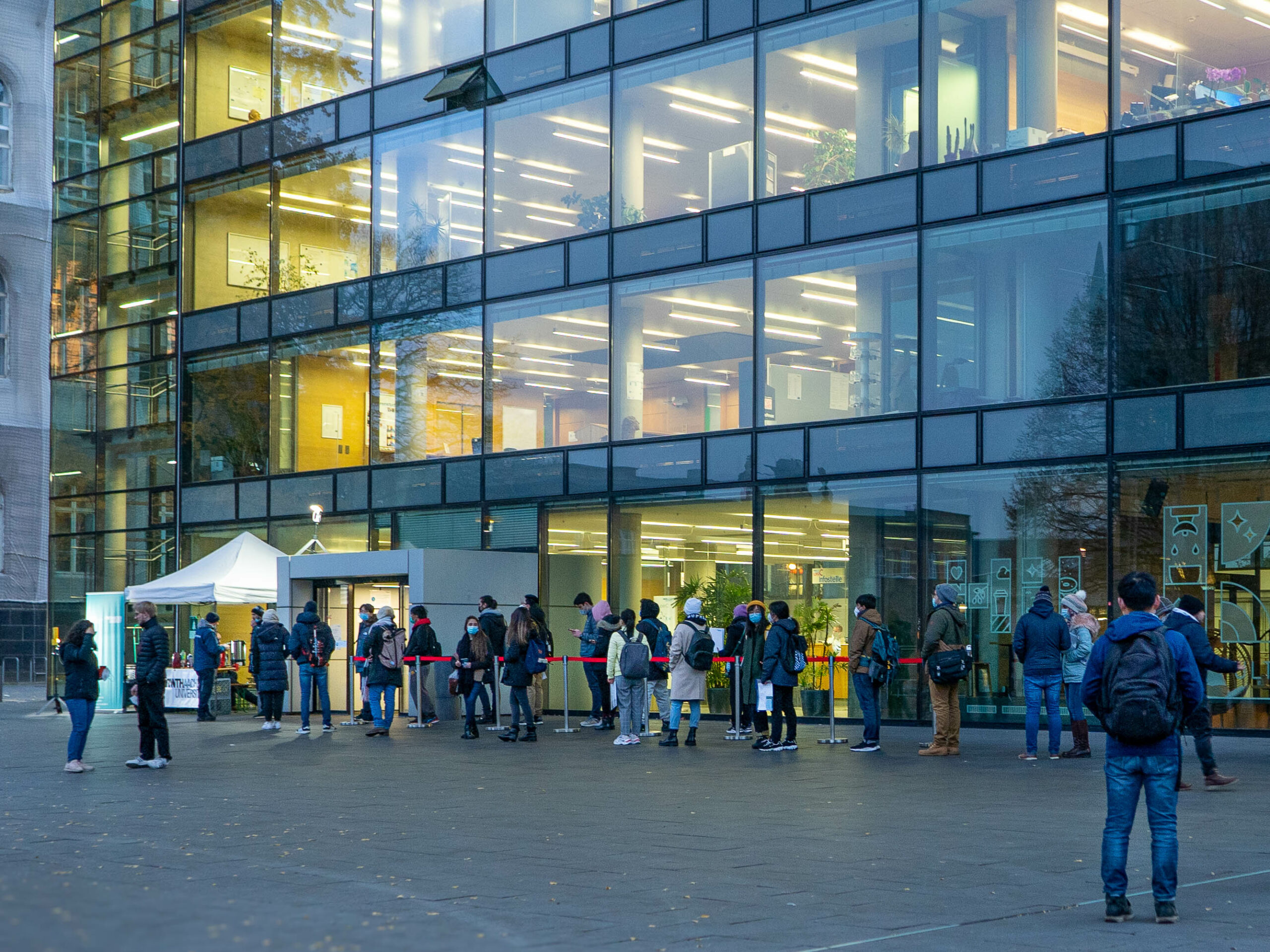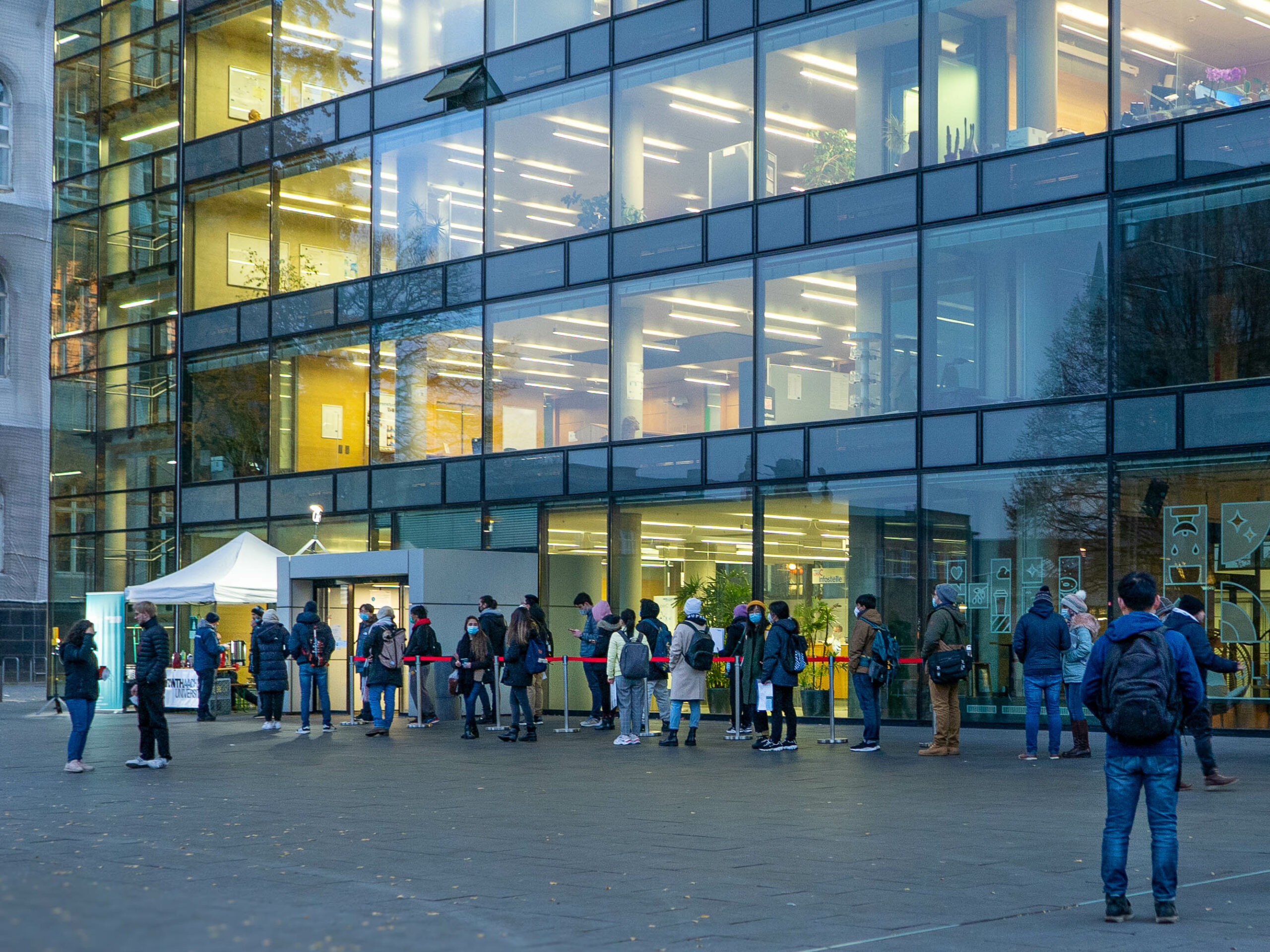—English version below—
Lange Nächte – Kühle Temperaturen
Allgemeiner Studierendenausschuss (AStA) und Ausländerinnen- und Ausländervertretung (AV) besorgt um die Situation an der Außenstelle des Ausländeramts.
In den letzten Tagen haben sich trotz eisiger Temperaturen lange Warteschlangen vor dem Super C der RWTH gebildet. Grund dafür ist die Terminvergabe der Außenstelle des Ausländeramts der Städteregion Aachen. Viele internationale Studierende müssen beim Ausländeramt ihre Visa verlängern, Aufenthaltstitel oder Arbeitserlaubnisse beantragen. Die manuelle Terminvergabe und ein Rückstau bei den Fällen führen dazu, dass sich internationale Studierende mitten in der Nacht und bei Minustemperaturen anstellen, um einen Termin zu ergattern. Die Verzweiflung der Studierenden ist dadurch zu erklären, dass die Vergabe der Visa mit der Sicherheit über deren Verbleib in Deutschland verbunden ist. Ohne eine rechtzeitige Verlängerung laufen Studierende Gefahr ihre Nebenjobs zu verlieren oder können Deutschland nicht temporär verlassen, selbst wenn es um gesundheitliche oder familiäre Notfälle geht.
Ana Pojoga, die Vorsitzende der Ausländerinnen- und Ausländervertretung (AV) der RWTH, zeigt sich besorgt um die Situation: “Vor allem bei den eisigen Temperaturen ist die Situation für unsere Studierenden unzumutbar“. Dabei war die Situation absehbar und das Problem bereits vor Beginn der Corona-Pandemie bekannt. Orpha Fiedler, die Vorsitzende des Allgemeinen Studierendenausschusses (AStA), bekräftigt: “Das ist ein Problem, welches schon seit mehreren Jahren durch den AStA kritisiert wird und sich nicht gebessert hat.”
Die bereits zuvor problematische manuelle Terminvergabe wurde im letzten Semester durch eine Terminvergabe per E-Mail abgelöst. Das neue System führte jedoch nur zu einem erhöhten Aufwand, längeren Wartezeiten und einem Anstieg an Rückständen. Aus diesem Grund regelt das Ausländeramt seit November die Terminvergabe wieder mit dem alten System. Ana Pojoga dazu: “Wir haben gesehen, dass die E-Mail-Terminvergabe nicht funktioniert hat. Umso wichtiger ist es jetzt, eine schnelle, funktionierende Lösung zu etablieren. Aber dafür fehlt anscheinend der politische Wille”.
Aus Solidarität und um den Studierenden das lange Warten während der kalten Nächte zu ersparen, haben die AV und der AStA versucht, der Situation mit einem provisorischen Ticketsystem entgegenzutreten. Damit konnten Studierende, die sich sonst mitten in der Nacht anstellen mussten, einen Platz in der Warteschlange reservieren und bis zur Öffnung Zuhause bleiben. Desweiteren wurden den in den Morgenstunden wartenden Studierenden warme Getränke zur Verfügung gestellt und Gespräche geführt, um die Situation zu erklären und Erfahrungsberichte zu sammeln. Allerdings ist das keine langfristige Lösung. “Wir sind letztendlich nur ehrenamtliche Helfer*innen. Wir haben nicht die Kapazitäten, um jede Nacht vor dem Super C zu verbringen und Symptombekämpfung für die Städteregion zu leisten” betont Nasya Hristova, stellvertretende Vorsitzende der AV.
Leider hat die Städteregion in der Vergangenheit nicht genug getan, um die grundlegenden strukturellen Probleme zu lösen. Sowohl die Vertreter*innen der Studierenden als auch die Hochschule haben in den letzten Jahren geduldig auf versprochene Verbesserungen gewartet, welche wiederholt nicht erfüllt wurden. Die aktuelle Situation hat allen Beteiligten innerhalb der Hochschule erneut deutlich gemacht, dass dieser Zustand inakzeptabel ist und sofortige als auch langfristige Lösungen dringend benötigt werden. Der AStA fordert daher die Leitung des Ausländeramts der Städteregion, Frau Nolte, dazu auf, Stellung zu beziehen.
Trotz der schwierigen Situation haben sich die RWTH, vertreten durch das International Office, der AStA, die AV und die Mitarbeitenden in der Außenstelle des Ausländeramtes zusammengesetzt, um nach einer Notfalllösung zu suchen. “Wenn es so weitergeht müssen wir Heizstrahler und Bänke aufstellen, damit die Studierenden wenigstens im Warmen warten können. Die Städteregion darf sich gerne finanziell beteiligen” so der Vorschlag von Ole Lee, Referent für Soziales des AStA.
Zuletzt möchten wir betonen, dass den Sachbearbeitenden im Ausländeramt, die auf Hochtouren arbeiten, keine Schuld an der Situation zukommt: “Ganz im Gegenteil. Wir sehen hier ein strukturelles Behördenversagen. Das große Problem ist der andauernde Personalmangel und ein fehlendes digitales Terminvergabesystem”, so Ana Pojoga.
Aachen, den 26.11.2021

Schlange vor dem Super C
© 2021 Jorik van Genuchten / AStA der RWTH
Das Bild kann in Bezug auf die vorstehende Pressemitteilung verwendet werden. Die Originaldatei ist auf Anfrage verfügbar. Um vorherige Rücksprache (Kontakt siehe erste Seite derMitteilung) wird freundlich gebeten. Der Abdruck ist für Pressezwecke honorarfrei. Die Quelle ist anzugeben.
—English version—
Long Nights – Cold Temperatures
The General Students‘ Committee (AStA) and the Representation of Foreign Students (AV) are concerned about the situation at the branch office of the Immigration Office.
In recent days, long queues have formed in front of the Super C of RWTH, despite freezing temperatures. The cause of this being the scheduling of appointments at the branch office of the Immigration Office of the City Region Aachen. Many international students have to extend their visas, apply for residence permits or work permits at the Immigration Office. A manual appointment allocation and a backlog of cases, results in international students lining up in the middle of the night, with temperatures below zero, in order to receive an appointment. The students’ desperation stems from the fact that their stay in Germany is directly tied to the issuing of their visa. Without a timely extension, students face the danger of losing their jobs or cannot leave Germany temporarily, even if it is for a medical or family emergency.
Ana Pojoga, president of the RWTH’s Representation of Foreign Students (AV), is concerned about the situation: „Especially with the freezing temperatures, the situation is unacceptable for our students“. The situation was foreseeable and the problem was already known before the start of the Covid-19 pandemic. Orpha Fiedler, president of the General Students‘ Committee (AStA), affirms: „This is a problem that has been criticized by the AStA for several years and has not improved.“
The manual appointment allocation system, which was already problematic before, was replaced last semester by an email appointment allocation system. However, the new system only led to a more intensive workload, longer waiting times and an increase in backlogs. For this reason, the Immigration Office has been using the old system again since November. Ana Pojoga comments: „We have seen that the e-mail appointment system did not work. It is all the more important now to establish a fast, functioning solution. Unfortunately, there seems to be a lack of political will to do so.“
Out of solidarity and to spare the students the long wait during the cold nights, the AV and the AStA tried to mitigate the situation with a provisional ticket system. Students, who would have had to wait in line during the night, in order to reserve a place in line, could now go back home and return when the Immigration Office opened, with a guaranteed spot in line. Furthermore, warm drinks were provided to waiting students and conversations were held to explain the situation and gather testimonials. However, this is not a long-term solution. „At the end of the day, we are just volunteers. We don’t have the capacity to spend every night in front of the Super C and fight the symptoms for the City Region (Städteregion)“ emphasizes Nasya Hristova, vice president of the AV.
Unfortunately, the City Region of Aachen has not done enough in the past to solve the fundamental structural problems. Student representatives and the university have both waited patiently for promised improvements in recent years, but have been let down repeatedly. The current situation has once again made it clear to all parties within the university, that the current state is unacceptable and that immediate, as well as long-term solutions, are urgently needed. The AStA therefore calls on the person in charge of the Immigration Office of the City Region of Aachen, Ms. Nolte, to take a stand.
Despite the difficult situation, the RWTH, represented by the International Office, the AStA, the AV and the employees in the branch office of the Immigration Office have sat down together to look for an emergency solution. „If it continues like this, we will have to set up heaters and benches so that the students can at least wait in the warmth. The City Region is gladly welcome to participate financially“ as suggested by Ole Lee, head of social affairs in AStA.
Finally, we would like to emphasize that the case workers in the Immigration Office, who are working at full speed, are not to blame for the situation: „Quite the opposite. We see a structural failure of the authorities here. The main problem is the ongoing lack of staff and a missing digital appointment system,“ says Ana Pojoga.
Aachen, November 26 2021

Queue in front of the Super C
© 2021 Jorik van Genuchten / AStA der RWTH
The image can be used in relation to the above press release. The original file is available on request. We kindly ask you to contact us in advance (see first page of the release for contact details). Reproduction is free of charge for press purposes. The source must be acknowledged.